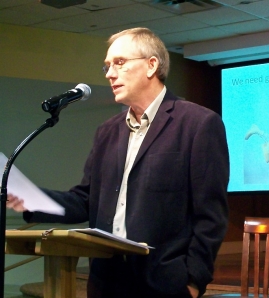Here’s a thought about the difference between faith and religion: Faith tends to make us secure in our relationship with God, opening wide our hearts and our minds; whereas religion tends to build on fear and insecurity, is easily threatened, and progressively narrows both mind and spirit.
One of the better by-products of having an “observer” frame of mind is the ability to see both sides – and more – of a story.
I’ve been this way all my life. Listening; asking questions; standing outside of what’s going on; trying to walk around with my eyes and ears open before saying anything; asking more questions.
I’ve always been legitimately astounded by polarization; it’s simply never made any sense.
CHURCH POLITICS: When I was a teen I remember watching people getting bent out of shape about church stuff, staking out opposing positions. It was as if the Universe would come to a crashing halt if someone who didn’t agree with some narrow viewpoint wasn’t corrected, censured, forced to recant or publicly exposed as a heretical sinner.
I remember wondering why people couldn’t just enjoy their relationship with God, and why it was so important to be right, and why it was so important that “those other people” knew that they were wrong, or why somebody had to be labelled as wrong in the first place?
Such arrogance; such obvious insecurity; such a desperate need to be “right;” such narrow, unimaginative poverty of spirit; such paralyzing lack of faith….
NEXT VERSE, SAME AS THE FIRST: It’s something I’ve seen repeated again and again over the years and in many venues, but most disturbingly in politics and religion. This sad, insecure need to be right all the time, and the equally absurd requirement that those people who disagree with us need to be wrong.
The sad phenomenon is front and center in many churches, and there are even Presbyterian ministers who have led or are leading entire congregations out of the denomination because it’s more important to be “right” (and for the other guy to be wrong) than it is to be a faithful witness to the Gospel of Love.
…it’s more important to be “right” (and for the other guy to be wrong) than it is to be a faithful witness to the Gospel of Love. Really?
RELIGION & POLITICS: This inability to live and to worship with people who disagree with us (folk who are guided by the same Bible, who love the same God, and who follow the same Jesus) is another version of the same kind of arrogance and narrow-spiritedness that is currently gripping the government of the United States.
Fact is, there are probably a dozen potentially effective approaches to any given challenge that our nation faces. It’s a great thing to talk about the differences, to promote the various merits and drawbacks, to argue the logic, to discuss the social implications and more. Some plans are going to be more effective, some less. Compromise, small victories, and a whole lot of give and take come with the process. But, at some point, something has to be done. But not if it’s more important to be “right” than to be a faithful steward of the responsibility to govern.
But not if it’s more important to be “right” than to be a faithful steward of the responsibility to govern.
- Show me the person who has all the answers when it comes to faith and I’ll show you someone who is dangerously arrogant and sadly insecure. God already sent Jesus, and you’re not him.
- Show me the person who holds the nation hostage over his/her need to be right and I’ll show you a politician who told a bald-faced lie when she/he swore to serve the people of the United States.
How many ways can I say this?
- All human knowledge is partial;
- all statements of faith fall short of the mark;
- all political theories are simply a small piece of a complex puzzle;
- consensus is a moving target;
- hard questions are more helpful than easy answers;
- I don’t know all that much myself, and I need the wisdom and encouragement of other people;
- “When I was a child, I talked like a child, I thought like a child, I reasoned like a child;”
- “When I became a man, I (should) put the ways of childhood behind me;”
- “For now we see only a reflection as in a mirror; it’s only then that we’re going to be able to see face to face;”
- “Now I know in part; then I shall know fully, even as I am fully known.”
And now these three remain: faith, hope and love. But the greatest of these is love. (1 Corinthians 13:11-13)
In love, and because of love – DEREK

No comments:
Post a Comment